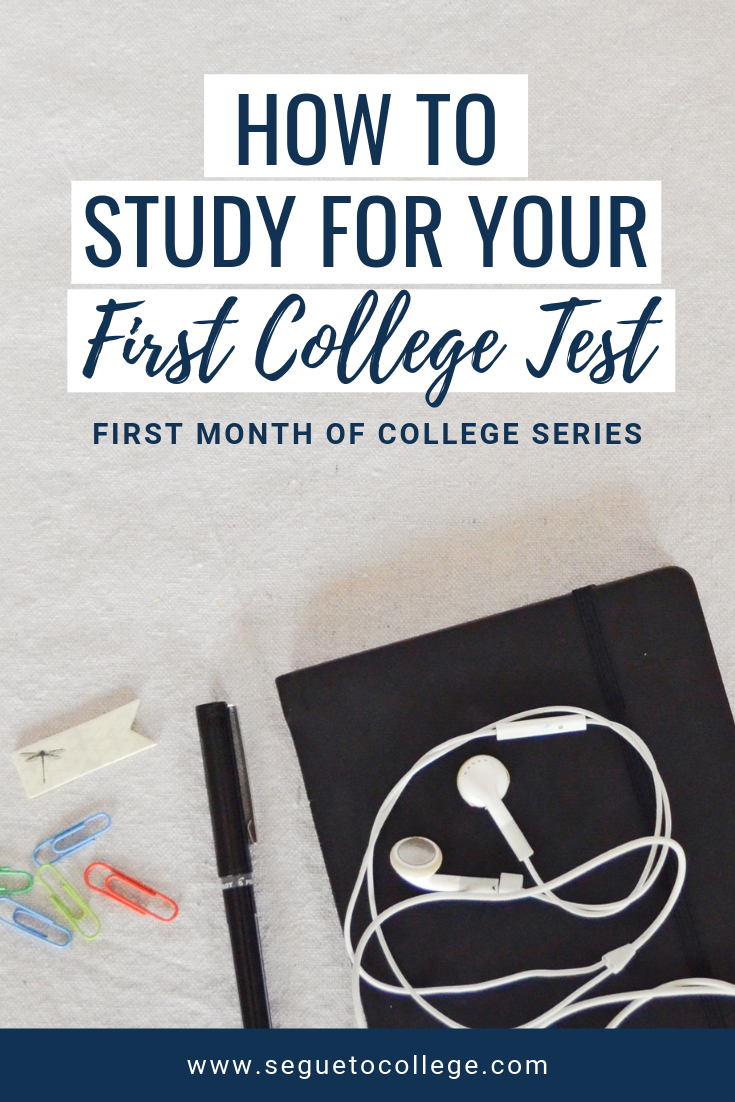How to Study for Your First College Test
You’re terrified. And you know you probably should be. Your first college test is approaching. Your teacher only talked about the test for 2 minutes. She didn’t even make a review sheet for you. How in the world are you supposed to prepare?
College classes are structured much differently than high school classes. For one thing, you probably have different teachers for every class each semester. Learning multiple different teacher’s testing styles can be overwhelming. Don’t panic! These 4 basic study tips can help you on every college test.
Take good notes.
You might be rolling your eyes right now, thinking “who doesn’t take notes in class?” You might actually be surprised. Some students try the “osmosis technique”—sitting in class and merely absorbing the material. In other words, they just sit there and stare at the teacher.
I would strongly discourage you from trying this technique. It doesn’t work for 99.9% of the population (excluding some future Nobel Prize winners out there). You must actively engage your brain in the class lecture!
Focus on the big points your college professor emphasizes. Don’t (please don’t) write down every word on the powerpoint screen. This is a waste of your time! It should only guide your note-taking. These words are not to be recorded word for word, unless your teacher specifically tells you this.
Focus on what your professor is saying, repeating, giving examples of, etc. These are the important concepts! If you miss something, feel free to ask questions. Students are often too embarrassed to ask the teacher to repeat information or explain concepts in a different way. But how will your professor know you’re not getting it unless you ask questions?
Review the assigned reading.
This is the step many students miss. Yes, you must read the assignment. (So if you skipped the reading, do it.) But also be sure to review the big concepts from your textbook. See what overlap exists between the reading material and the class lectures.
When reviewing your textbook reading, focus on the chapters’ layouts—bold and italicized terms, headings, examples, etc. Usually your teacher will lecture on the big concepts. But keep in mind all of your reading assignments are considered fair game on class tests. After all, you were supposed to read it.
Review your class notes.
When reviewing your notes, be sure they make sense. Writing quickly can cause illegible scribbles or confusing wordings. If you missed something, don’t be afraid to ask a reliable classmate for notes.
Don’t wait to study your notes until the night before the test. Try taking a brief look at your class notes throughout the week. This habit helps you grasp the information better. Try arriving 5 minutes early to class each day and reviewing your notes before the bell. You’ll find you better understand the material when the test comes.
Several different techniques can help you study your notes for the test. But one studying technique I would generally discourage you from is creating notecards. In my personal experience, this process is incredibly time-consuming and usually leaves little time for actual studying. If you can find a preexisting Quizlet, go for it. But don’t waste valuable study time making these!
**The exception to this study method would be memorizing lists. These kinds of tests or quizzes are the exception, not the norm. Certainly consider making and using notecards for a science quiz over all the human bones or a Spanish quiz over weekly vocabulary.
One studying technique that works well is re-processing your notes. This idea allows you to take your notes and process them in a different form. For example: when I was studying, I often took my notes, went to a quiet place alone and talked aloud. I would use my notes to explain the content to myself (like I was lecturing an invisible class). Explaining the information aloud showed me what I did and didn’t understand.
Another way to re-process your notes is by rewriting them. Yes, this takes time but is worth it. For example: in class you might take notes with bullet points or Roman numerals. Try transforming your notes into an essay form with paragraphs. This is a great way to synthesize what you have learned into a different form.
Listen closely to the test overview.
Again, this may seem pretty obvious. But this is critical. Your college professor does not like to waste precious class time sharing unimportant material. (Believe me.) If your teacher takes time out of class to explain the format of the test, the content on the test or her grading style, listen up. Take notes. Don’t just sit there and passively intake this information.
Your college professors will most likely not do any review in class. This process is all on you. This isn’t unfair. It’s just college. They expect you to take initiative if you have questions or need guidance.
And please (oh please) actually study what your professors tell you to study. They aren’t trying to trick you. If you study what they tell you to study, you have a higher chance of getting a good grade. Take advantage of any guidance your teachers provide you.
Your first college test can be incredibly daunting. But it doesn’t have to be! Plan on taking good notes, reviewing the assigned reading, reviewing your class notes and listening closely to the test overview. Prepare to be successful by forming good study habits!










